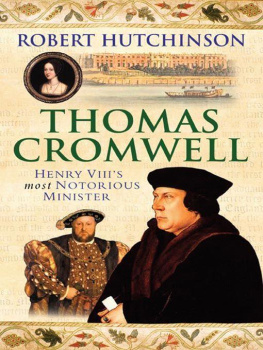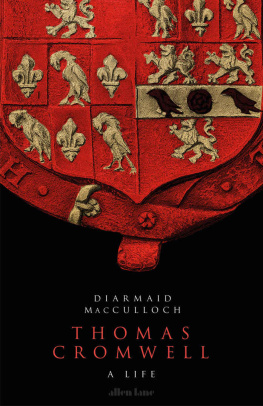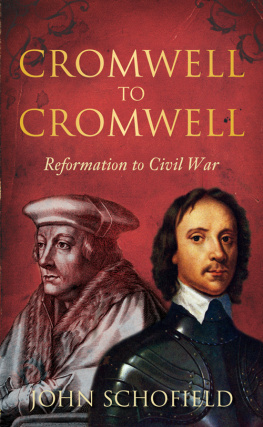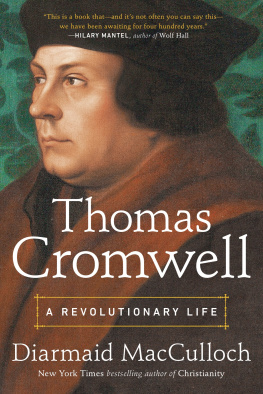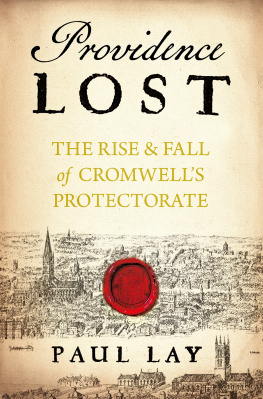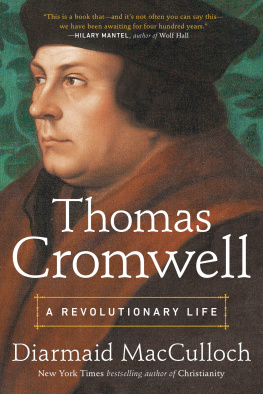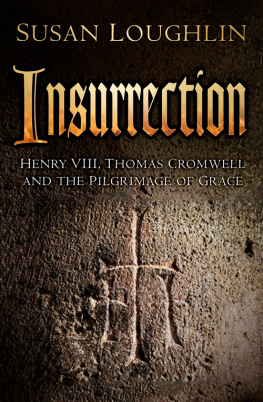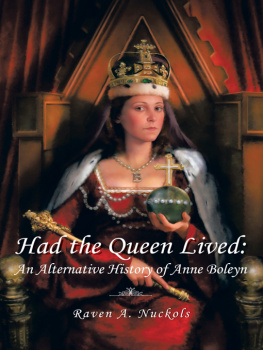For Sue and Mike


Contents
This book could not have been written without the help and active support of many friends and colleagues, not least my dear wife, who has been forced to consider every single enviable and unenviable facet of Thomas Cromwells complex character over more hours than I (and she) would probably care to admit. It could not have been written without her abundant kindness, uninterrupted patience and unstintingly loyal support.
Much of the material for this book has been drawn from contemporary sources, and I believe it is vital to consider the protagonists actual words in this extraordinary human drama of greed, corruption and ambition. My thanks, as ever, are due to all those whose great kindness has enabled me to track down documents and rare books. In particular, I would like to thank Robin Harcourt Williams, Librarian and Archivist to the Marquis of Salisbury at Hatfield House; Bernard Nurse, Librarian, and Adrian James, Assistant Librarian, of the Society of Antiquaries of London; the ever-willing and helpful staff at the National Archives, Kew; the Manuscripts and Rare-Book Departments at the British Library; Kay Walters and her team at the incomparable library at the Athenum; the Revd Father Jerome Bertram for much help, as always, with Latin translations; Ian Drury of Weidenfeld & Nicolson for all his encouragement; Ilona Jasiewicz, former Managing Editor, for her manifold kindnesses and patient assistance; Tom Wharton, her successor; Lisa Rogers for her painstaking care, attention to detail and considerable editing skills; Alison Waggitt for the index; and finally Marcel Hoad and his team at Fowlers for their invaluable administrative support in so many ways.
To all these kind people, I would like to pass on my grateful thanks. I must point out, however, that any errors or omissions are entirely my own responsibility.
Robert Hutchinson, West Sussex, 2006
This was the cause why he was envied of the nobility, being by birth so much beneath them and by preferment so high above most of them. Besides, many of his advancements were interpreted not so much as honours to him as injuries to others, as being either in use improper or in equity unfit or in right unjust or in conscience unlawful for him to accept.
THOMAS FULLER, CHURCH HISTORY OF BRITAIN, 1655
Early on the morning of Saturday, 10 June 1540, Thomas Howard, Third Duke of Norfolk, summoned Sir Anthony Wingfield, the Captain of the Kings Guard, to the Parliament House at Westminster. He ordered him to arrest Thomas Cromwell, Henry VIIIs all-powerful Chief Minister, after dinner then normally served around noon later that day. The captain was astonished by the instruction, but Norfolk told him bluntly: You need not be surprised. The king orders it.
A few hours later, the Privy Council gathered at the Palace of Westminster for their meal. As the councillors entered the maze of buildings beside the River Thames, a sudden gust of wind blew off Cromwells hat. It was the polite but bizarre custom during this period for all gentlemen to remove their hats when another had lost his. That day, the councillors rudely ignored the Ministers plight and kept their caps firmly on their heads. Looking around at their hostile faces, he commented: A high wind indeed it must have been to blow my bonnet off and to keep all yours on. Apparently blind, they had now become deaf as well and his quip went unacknowledged.
Cromwell must have recognised their silence as an omen of what was to come. His instincts were correct. They also shunned him at the dining table and he appeared isolated, if not wholly ostracised, as he consumed his dinner. When they departed for the nearby Council Chamber, he sat at an open window, as was his habit, listening to the clamorous petitions for justice from the raucous crowd waiting outside in the courtyard.
An hour later, at about three oclock, the Lord Privy Seal rejoined the group and found them seated in silence around the Privy Council table. Cromwell must have detected an atmosphere of high tension within the chamber. He assumed they had already been discussing some of the issues listed for debate that afternoon, and while walking towards his vacant chair commented: You were in a great hurry, gentlemen, to get seated.
Again, he was ignored.
He was just about to sit down at the head of the table when Norfolk jumped to his feet and, pointing an accusatory finger, shouted: Cromwell! Do not sit there! That is no place for you! Traitors do not sit amongst gentlemen.
After all the conspiracies against him during the past few months, the Minister, in his heart, must have anticipated that at some time soon and in some familiar place, his nemesis would strike. He instantly recognised that the terrible hour of reckoning had finally arrived.
Thomas Cromwell, the last and greatest of Henrys ministers, was an ambitious and totally corrupt statesman, very much a creature of the turbulent and violent Tudor times in which he lived. A frighteningly efficient administrator, he was, however, no mere pen-pushing bureaucrat. In truth, Cromwell was an opportunistic jack-the-lad, a ruffian on the make. This wholly self-made man, who desperately aspired to noble gentility, was also a devious, ruthless instrument of the state. Some said Cromwell was Machiavellian in his methods. His firm grip on the levers of power in Henrys realm was certainly often devoid of compassion.
Equipped with a remarkable gift of low animal cunning, a capacity for raw deceit, and employing extraordinary political skills and vision, he clawed his way up from rough, humble origins to become the most powerful man in England ranking only below his fickle and sometimes malevolent sovereign. There were to be casualties aplenty on his perilous road to amassing his enormous wealth and domination of the state. Cromwell had no compunction whatsoever in trampling underfoot the mangled bodies of those he had exploited or crushed as he deftly and swiftly clambered to the slippery pinnacle of Tudor government.
Scruples was a word unaccountably missing from his vocabulary.
In sixteenth-century England, few other individuals, except those of the blood royal, made such an impact on everyday life as Thomas Cromwell. Some of his government measures live on to affect us to this very day. The lawyers carefully drafted legislation transformed Henrys nation into what we would now recognise as a totalitarian Stalinist state. Many would die barbarous deaths as a direct result of his policies as he directed the executioners axe, targeting his victims with the sure hand of a skilled surgeon cutting out a cancerous growth. In Cromwells simple, utilitarian philosophy of life and death the end always justified his means.
To many, not least Cardinal Reginald Pole, whom he tried to assassinate and whose family he manipulated and slaughtered, he was always that emissary of Satan who perverted both the King and the ancient Catholic religion of the realm. But despite grim warnings of the consequences of his actions, this loyal Minister always provided Henry VIII with exactly what he wanted: wealth, power and primacy even though, at times, his policies would threaten the very throne of England.
Cromwells dissolution of the monasteries his audacious legal pillage that remains the greatest single act of privatisation in the history of Britains governance also abruptly ended their care of the poor and sick and the provision of education and spiritual comfort to thousands of pilgrims. An additional social by-product of the dissolution was the fashioning of a new affluent class of gentry through the redistribution of monastic wealth.
Next page
